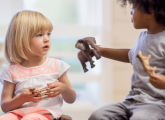The EYFS reforms offer us an opportunity to reflect on and reframe our language around inclusion and how we promote the unique child’s principles.
Every child is learning, but this may be at different rates and in different ways. For example, suppose your setting has an autistic child.
We should be mindful of categorising all of their learning behaviours as delayed when, in fact, their learning is merely different from what we may ‘typically’ observe.
As educators, we must strive to understand this diversity, and where support is needed, we should use a strengths-based approach to scaffold learning.
When discussing SEND, develop new language habits, talking firstly about the child’s strengths and interests, followed by their needs. The strengths are what good practice will be built upon.
Before we even begin to think about what children should be learning, we should be invested in understanding how they learn. This can be done through the Characteristics of Effective Learning (CoEL).
Tuning in to children’s dispositions and behaviours, both verbal and non-verbal, provides insight into their engagement, motivation and thinking, and is often best observed in situations where the child is at ease, for example, through playing and exploring.
Carry out focused observations using the CoEL to guide you. You will find that you focus more deeply on understanding the child rather than making ‘tick box’ developmental judgements.
According to Penn Green’s A Celebratory Approach to SEND Assessment in the Early Years (DfE, 2019), SEND children’s progress within the current Development Matters is not demonstrable because the milestones and statements broadly describe typically developing children.
Children whose learning differences are also likely to be long term will also be judged by ableist Early Learning Goals at the end of the Foundation Stage. This risk remains with the EYFS reforms.
Therefore, educators must seek to expand beyond a single document to describe child development until those documents fully embrace the diverse nature of learning.
Explore different descriptions and documents that describe child development and look for those that celebrate diversity and learning differences.
I recently spoke with a parent who shared that her concern with the EYFS reforms was that they remained exclusionary to SEN children’s progress.
While she recognised that her child may work at a different pace to others, she believed this should still be encouraged and celebrated. So she began to identify the ‘inch-stones’ within her child’s development and paid closer attention to those smaller steps that lead to broader skills.
As a parent of a SEN child, she expressed how hard it can be to engage with an educator if all they can see is what the child cannot do. So celebrate the ‘huge small-wins’.
Ensure that you break down how you intend to support broader milestones and provide feedback about these smaller steps in progress.
A recent project by the Froebel Trust (Flewitt & Cohen, 2020) found that children with particular characteristics can have their learning overlooked or may receive less observational attention.
For example, children who were outgoing, highly verbal, and interacted more with adults had more observations than those quieter or less communicative in English.
This suggests that our view of what learning ‘looks’ like may be relatively narrow, and we need to ensure that children who learn differently are not overlooked or
only addressed when we need confirmation of our concerns.
Review your SEND documentation. Is there a balance of learning-based observations and areas of concern? If not, we need to go looking for their learning.
A critical issue within early years, education and SEND is that we can often view ourselves as the helpgivers, and the parents as the helpseekers, but we should never assume to know the level of knowledge and expertise a parent has without getting to know them.
The truth is that parents and educators are continuously learning from each other in a collaborative partnership. Acknowledging this early on can help to build a strong foundation for a trusting and responsive relationship.
Value the parent’s perspective as equal to your own. Share any documents you use in the setting with families so that they know what to expect and when. Equally, ensure
you ask for parents’ perspectives – they will help you personalise support for their child.
The EYFS reforms have ignited passionate debate in the early years. A key question for many educators is how we are developing and sustaining equitable practice and pedagogy that helps all children to thrive.
One such way of doing this is to acknowledge that inclusion is a state of becoming rather than being (Nutbrown, 2012). Understanding inclusion as an area of continuous learning helps with reflection and growth.
Our understanding of SEND changes rapidly, so we must be open to the fact that good practice itself changes with time.
Don’t shy away from difficult situations or conversations involving SEND. Ask questions, seek clarity, and challenge your own perceptions about inclusion. This leads to growth.
Kerry Payne is an Early Childhood SEND specialist based in London and works as an independent consultant and trainer. Read more from her at eyfs4me.com.

Theories about empathy – How it develops in Early Years
Editors picks
